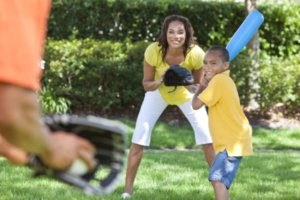Parent Self Care: Aristotle Says Go Out and Play

Note this Wisdom of the Ages: As a parent, you have a right -- actually, a responsibility -- to make a complete monkey of yourself from time to time. Consider it a form of parent self-care.
Dating back to the time of the ancient Greeks, when Aristotle extolled the virtues of leisure, successful human society has recognized the importance of play. Play takes many forms. The ancient Greeks, for example, valued "Schole," which can be defined as having time for oneself, doing something for its own sake, or embracing experiences instead of outcomes. Aristotle spoke of leisure in many forms – a way of life, an openness and connection to life experiences -- all of which leads to self-understanding.
Play is a great tool to deal with stress. It is a simple, productive way to improve the quality of life. Play can be quiet contemplation, freeze tag, flirtation, a food fight, climbing a tree, the study of philosophy, a walk in the woods, or any experience you do for its own sake that provides you with enjoyment.
In our modern society, we tend to reserve play for vacations. We have no problem planning a ski trip or lounging on the beach during the two weeks of vacation we get every year, but what happens during the remaining fifty weeks of the year? We tend to become so absorbed in life that we neglect that very important/critical need in our lives, the need for Schole.
Sparta was a thriving culture – much like modern society – based on expansion and production. And yet, the fall of Sparta is often credited to the culture's lack of leisure. In contemporary society, we risk the fate of Sparta: as we mature, engaged in the drive to produce and achieve, we tend to forget how to play.
When asked, "What do you do?" how do you answer? When was the last time you heard someone say, "I frolic," "I play soccer," "I enjoy myself," or "I do what makes me happy and whole?" Our culture almost insists that we hold onto the protestant work ethic. Its benefits have grown our success, resources, and efficiency. Yet we tend to spend our earnings on more "stuff" rather than on ourselves or our families.
As a parent, it helps to have something before you can give it to another. To fill another's chalice, your flask must be full. In other words, for us to coach our children to be happy, balanced, accomplished people who explore and reach for their greatest potential, we must strive to do the same.
We often mistakenly teach our children that play is bad. We tell them to stop playing around, to pay attention, and to stop acting like a child.
Instead, let's teach them that play is essential. Include play as a cornerstone of each day. Children learn by watching their parents. It's most important that you, as the parent, enjoy yourself and fulfill yourself as a form of parent self-care. Now, that's a powerful lesson to teach your kids!
The Paradox of Play is that while it is done for its own purpose, it has many positive and meaningful benefits. Play is a human need as important as food, shelter, and social connection. It should not be reserved for those rare times that we can plan to get away. Play should be an intentional part of every day, and done for its own sake.
While this is a valuable lesson to all parents, it is essential to parents of kids with ADHD and related challenges. For one, humor and play are great motivators for children. Since executive function challenges are very often a challenge of motivation, parents' ability to play, take things lightly, and find the humor in a situation can inspire their children and redirect negative behavior.
In addition, according to Aristotle, leisure offers a different view to our inner world. We can define, embrace, change, or escape our established roles through play. When we see what we do for our kids as purposeful and valuable for its own sake, we can take on those roles with more compassion and avoid resentment.
In other words, is helping your children choose clothes or organize schoolwork a chore or an act of sharing and care? Is exploring new coping strategies an adventure in a great experiment or another toil before the day is done? Your ability to approach your role as a parent through the lens of leisure can help you make this choice.
That means that play can influence how fulfilled you are when you do things for your family. Indeed, all of us could benefit from a little more Schole in our lives, more compassion for and replenishing of ourselves. Ironically, that gift to yourself as parent self-care could be the greatest gift you have to offer your children.

